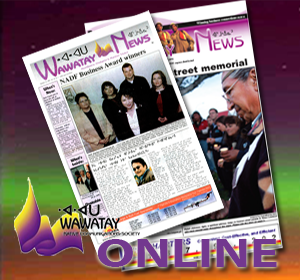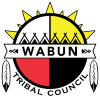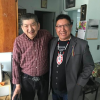L-R: Jennifer Thomas- Director Nishnawbe -Gamik Friendship Centre, Tana Troniak-Primary Executive First Step Womens Shelter, Darlene Angeconeb-Acting Director Equay-Wuk, Her Excellency Mrs. Sharon Johnstone, Mrs. Cherry Lawrance- Wife of Sioux Lookout Mayor Doug Lawrence, Andrea Boles, Betty Anderson, Shirley Wesley.
The town of Sioux Lookout was the setting for a visit by the Governor General His Excellency David Johnston and his wife Her Excellency Sharon Johnston on March 30th as part of a tour they are conducting throughout northern Ontario.
One of the events scheduled in the days itinerary was a visit to the Equay-Wuk (Women’s Group) by Her Excellency to meet with the Director of the organization Darlene Angeconeb and representatives from First Step Women’s Shelter (Tana Troniak-Primary Executive ) and the Nishnawbe -Gamik Friendship Centre (Jennifer Thomas- Director) to engage in a round table conversation about how their organizations work to improve the conditions of women, youth and families who reside in the 31 remote First Nations communities that makeup northwestern Ontario.
The morning started with Angeconeb who explained how her organization operates, followed by Troniak and then Thomas followed by an informal discussion during which many questions were asked by Her Excellency who expressed a great interest in relation to how First Nations woman are coping with everyday problems such as the challenge for change and many other issues that are happening in the communities especially in the remote North, relating during the course of the discussion about how she has witnessed poverty of this nature on Vancouver East Side amongst the First Nations people who reside there.
She spoke to Wawatay News at the end of the event.
Q. How have you enjoyed your visit so far?
A. I think it’s been very meaningful for me , because I think that the services they are providing to avery large number of communities is amazing, they are working with some very complex problems and they are doing it in a straightforward way. I’m very impressed.
Q. What do you think needs to be done to address poverty issues amongst First Nations people’s. Do you see a solution?
A. Well I think poverty is underlying much of the violence and abuse we are seeing and I think wehave to find a way, these are our own communities, we have to find a way. First we have to start with education, education is the key if they are educated they will develop skills and I think we have to provide an independence for them to be developing their communities and developing that they will actually have jobs within their communities. We were talking today with women, of course in developing simple skills such as filing, you know being able to do some kind of secretarial work to be able to make a community run that important. We sometimes think education is doing a post-doctorate or something, it just needs to be very basic skills to add to the community.
Q. Do you think enough is being done in in the areas of education and skills training?
A. Oh, I think the school system has to improve and from the white persons perspective we have to understand the Aboriginal history, that has to be part of the history for Primary, Secondary and University level, that is mandatory, that happening, that’s desirable outcome of our new government and I thinking terms of the schooling itself ,its absolutely vital that children have the same opportunity and the same amount of money which is not being spent, they have to increase the amount of funds so that learning disinteresting and then they also have extra curriculum things that are fun for kids. Then school becomes fun.
Q. The Missing and Murdered Indigenous Women. What are your views on this.?
A. Well I guesse I have very strong views on that, because I have five daughters and anyone of them could be a missing woman, but I have also spent a considerable amount of time on the Vancouver East Side and that’s where many of these women who were missing and then murdered or never discovered. Down in the East side yousee people in a real human drama and many of these people are there because of the poverty, things that have driven them down there and I think it is absolutely essential to understand the reason they are going into areas that are dangerous and they are hitchhiking sometimes just being in the wrong company they are comprising themselves. Very important.
Q. Do you see Northern Ontario having more or less problems than the rest of Canada.
A. I think they are different problems. I think people can live closer to their traditional values in Northern Ontario than in Southern Ontario, so I think they are different problems and it would have to take different approaches you know especially when people move into the cities whether it’s other provinces, Winnipeg, Vancouver East Side or Toronto or they are in Montreal what happens in the city is different from these remote communities where you have to fly in. You have two different solutions.
Angeconeb spoke about the event. “Equay-Wuk had a visit from the Governor-Generals wife Her Excellency Sharon Johnston. She was very interested in the women’s issues that are happening in the communities especially in the remote North. I think she is aware that a lot of the problems do stem from the Indian Residential Schools and the inter -generational effects we happen to be going through right now, so it was a good visit, I really liked her and hopefully we will stay connected somehow and the other organizations as well with Tana Troniak from First Step Women’s Shelter and Jennifer Thomas from the Friendship Centre as well.”











Gold has arrived. Here in the north of Ontario we see vast streams of gold shimmering across the landscape as autumn is here and the the leaves are turning...
I am the product, evolution of many thousands of years as are you. I grew up on the land in the remote far north of Ontario following in the footsteps of my...